
Sustainable public procurement (SPP) is a strategic approach that goes beyond just buying goods and services at the lowest price. It incorporates environmental, social, and economic considerations into public purchasing decisions. In simple terms, it means that governments prioritize suppliers who adhere to sustainability standards—such as using eco-friendly materials, maintaining fair labor practices, and supporting marginalized communities. For women entrepreneurs in Bangladesh, this presents a powerful, yet underutilized, gateway to economic inclusion.
In recent years, Bangladesh has seen a commendable rise in women-led enterprises. Data from the Bangladesh Bureau of Statistics suggests that women own around 7.2% of all businesses, predominantly in the cottage, micro, small, and medium enterprise (CMSME) sector. These businesses are concentrated in areas like garments, jute products, food processing, beauty services, and e-commerce. Organizations such as the Bangladesh Women Chamber of Commerce and Industry (BWCCI) and the SME Foundation have been instrumental in promoting women’s entrepreneurship. Despite their growth, these businesses often remain small and informal, operating with limited access to public procurement markets and large-scale contracts. This is where awareness of sustainable procurement could become a game-changer.
Recent studies and surveys highlight a major concern: 60% of women-owned enterprises in Bangladesh are unaware of sustainable public procurement policies. This lack of awareness isn’t just about not knowing the policies exist—it’s about not understanding the procedures, benefits, or even how to begin the registration process for government tenders. Barriers include complex language in procurement documents, limited internet access in rural areas, and a general lack of training on how to engage with public systems. Many women also cite bureaucratic red tape and male-dominated procurement committees as deterrents to participation.
Bangladesh is committed to achieving the UN’s Sustainable Development Goals (SDGs), including Goal 5 (Gender Equality) and Goal 12 (Responsible Consumption and Production). Yet, unless women-owned businesses are actively included in public procurement frameworks, these goals will remain out of reach.
Inclusive procurement leads to diverse suppliers, equitable income distribution, and sustainable economic development. Globally, countries like Kenya, Canada, and South Africa have implemented gender-responsive procurement policies to support women entrepreneurs. Bangladesh can take cues from such models and develop localized strategies that ensure fair participation.
The underrepresentation of women in sustainable public procurement is not due to a lack of ability, but a lack of awareness and access. By closing this gap, Bangladesh can unlock the untapped potential of thousands of women-led businesses, creating a more inclusive economy that supports both gender equity and environmental sustainability. For sustainable public procurement to truly be sustainable, it must be inclusive. And that begins by making sure every woman entrepreneur, whether in Dhaka or Dinajpur, has the knowledge and tools to participate.



-112x63.27.webp)




-132x74.57.webp)



Comments
There are no comments for this Article.